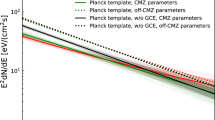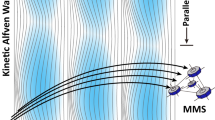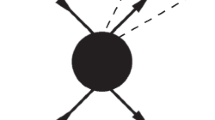Abstract
THE spectrum of the mesons near their place of production can be deduced from the spectrum observed near sea-level. The probability of a meson reaching sea-level with a final momentum p is, according to Euler and Heisenberg1, given as follows: All quantities have been expressed in terms of momenta, the symbols having the following meaning: q = 2,000 Mev./c., the momentum loss on traversing the atmosphere. p1 = 200 Mev./c, the momentum loss on traversing the atmosphere lying above the meson-producing layer. , with H the height of the homogeneous atmosphere, ï the average life of the meson, μ mass of the meson.
This is a preview of subscription content, access via your institution
Access options
Subscribe to this journal
Receive 51 print issues and online access
$199.00 per year
only $3.90 per issue
Buy this article
- Purchase on Springer Link
- Instant access to full article PDF
Prices may be subject to local taxes which are calculated during checkout
Similar content being viewed by others
References
Euler and Heisenberg, Ergeb. exakt. Naturwiss., 17, 1 (1938).
Nature, 158, 414 (1946).
Author information
Authors and Affiliations
Rights and permissions
About this article
Cite this article
JANOSSY, L., WILSON, J. Interpretation of the Meson Spectrum Near Sea-Level. Nature 158, 450–451 (1946). https://doi.org/10.1038/158450b0
Issue Date:
DOI: https://doi.org/10.1038/158450b0
This article is cited by
-
Current problems of high energy cosmic ray primaries
Acta Physica Academiae Scientiarum Hungaricae (1972)
-
Sull'eccesso positivo della radiazione cosmica
Il Nuovo Cimento (1948)
Comments
By submitting a comment you agree to abide by our Terms and Community Guidelines. If you find something abusive or that does not comply with our terms or guidelines please flag it as inappropriate.



